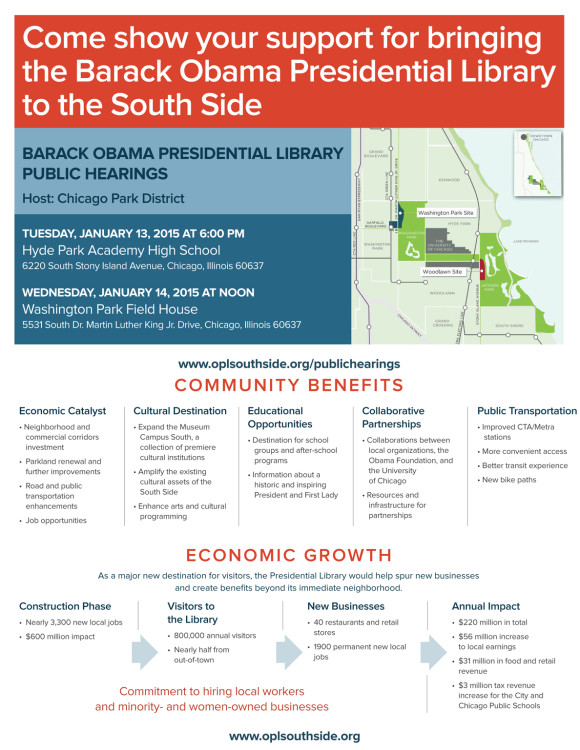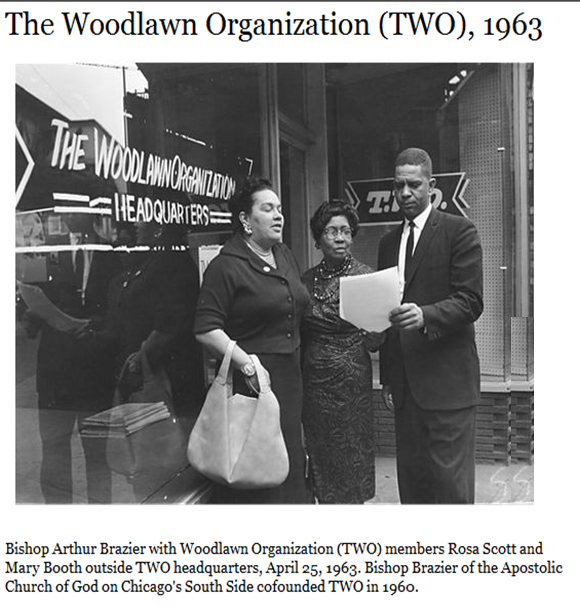The Legacy
-
Welcome to the Bishop Arthur M. Brazier Legacy Page
As Bishop Brazier's great work continues here at the foundation, we feel it is important to pay homage to the great sacrifices made by Bishop Brazier and other African-American leaders here in Chicago and across the nation. So, we have started to document this work, beginning with the Northern Civil Rights Movement in the 60's. Please visit us often as we share historic archives, photos, videos and interviews that celebrate our history.
Reflections of the Work
-
City of Chicago Inauguration:
The inauguration of Rahm Emanuel as Mayor of the City of Chicago, Susana A. Mendoza as Clerk of the City of Chicago, Kurt Summers as Treasurer of the City of Chicago, and members of the Chicago City Council was held yesterday at the Chicago Theatre. Dr. Brazier, our President & CEO, attended the inauguration. The Arthur. M. Brazier Foundation extends our congratulations to all who were inaugurated.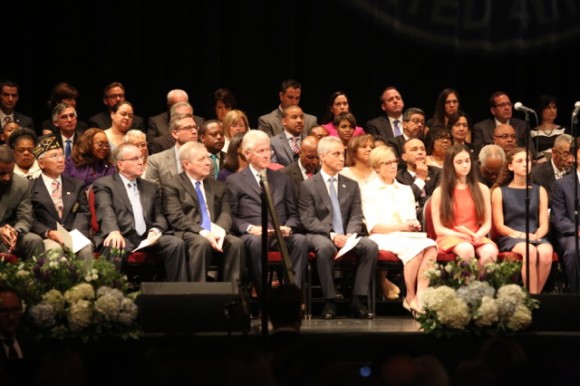
-
Barack Obama Presidential Library Public Hearings
PUBLIC HEARINGS
Barack Obama Presidential Library Public Hearings
Host: Chicago Park District Tuesday, January 13, 2015, 6:00 pm, Hyde Park Academy High School Wednesday, January 14, 2015, Noon, Washington Park Field House
The Chicago Park District will host public hearings to receive community input regarding the University of Chicago’s proposed sites for the Barack Obama Presidential Library in the Washington Park and Woodlawn neighborhoods. Locating the Obama Presidential Library on Chicago’s South Side offers a rare chance to reinvigorate the economy of nearby communities and make improvements for the area’s infrastructure and parks. The presidential library will create a global destination for learning and engagement. -
Black History Month Video Series Part 4 – Rev. Jackson Speaks on the Northern Civil Rights Movement
Throughout the month of February we shared intimate recounts of the unwavering work of a true activist, Bishop Arthur M. Brazier. True in the sense that the work was for the people, not recognition.
When looking at our current situation here in Chicago, it is helpful to take a look back to gain understanding, inspiration and strength from those who came before us and paved a way to a better life.
It is not only our goal to continue to build on the foundation of excellence Bishop Brazier laid for us, but we will also continue to take a look at the rich history of the leaders of his generation that moved us out of "occupation" in the north, as Rev. Jessie Jackson, Sr. so brilliantly states in Part 4 of our video series.
Below is an excerpt from our interview with Rev. Jackson:
When I came to Chicago in 1964, Saul Alinsky was organizing the Woodlawn community, to stop the encroachment of the University and taking people’s property. Bishop Brazier was leading that fight and I was working the next year as an organizer for Dr. King."
Bishop Brazier embraced me and my family, and nurtured me, so my relationship with him is quite personal because of his warm embrace – his maturity.
When Dr. King came to Chicago, ministers closed doors in his face and locked him out. Rev. Brazier invited Dr. King to Chicago and walked with him. It’s easy to love Dr. King, the martyr, who’s dead but reject him, the marcher, when he was alive. He embraced Dr. King the marcher and Dr. King the martyr.
There’s a new Woodlawn today. The beautiful church, the school, the Y, the home ownership, the connection with the University; he recognizes the best of ministry and a searing quest for justice and fairness.
- Rev. Jessie Jackson, Sr.
-
Black History Month Video Series | Part 3 – First Hand Accounts of the Work
For every man, there is a necessity to establish as securely as possible the lines along which he proposes to live his life. For Bishop Arthur M. Brazier those lines were self-determination of and respect for individuals demonstrated through a life of service for their betterment, both inside and outside the church.
Bishop exhibited the consistent courage to make the unpopular decisions: working with the University of Chicago in their Woodlawn expansion to ensure current residents were treated with respect; repurposing 63rd St bringing down the L; challenging the school system to redefine the narrative on the education of the African-American child across Chicago; reframing what adequate housing meant for people of color across Chicago and focusing Woodlawn on creating solutions to its problems rather than waiting on someone else to solve them.
He believed neighborhoods reach economical, educational, financial, moral and spiritual freedom when the wholeness of living in community becomes a way of life. He was a visionary, community developer and civil rights organizer who used his influence to convene power and bring them to a common understanding of the needs of the Southside communities. We at the Arthur M. Brazier Foundation are honored to continue that focus on community self-determination.
I. David Byrd, Chief Operating Officer, Arthur M. Brazier Foundation
-
PHOTO: BISHOP BRAZIER AND Chicago Urban League executive director Edwin C. “Bill” Berry
Watch "The Activist | Part 2 - The Northern Civil Rights Movement" to learn more about their work to build a better Chicago.
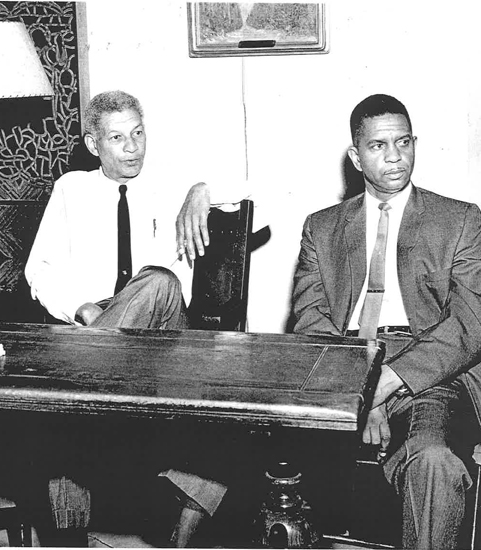
-
Black History Month Video Series Part 2 | A Look at the Northern Civil Rights Movement
The Civil Rights Movement took root in Chicago thanks to the fearless leadership of men, women and youth who refused to accept the status quo and stood united for change. Through negotiation, litigation and demonstration, these brave individuals helped change Chicago and the nation. Among those great leaders were Chicago Urban League executive director Edwin C. “Bill” Berry and Bishop Arthur M. Brazier.
Bishop Brazier and Bill Berry were part of a strategic alliance of diverse business, civic and faith leaders that welcomed Dr. Martin Luther King, Jr. to Chicago and inspired hundreds of thousands of Chicagoans to raise their voices against the forces of segregation that denied people of their basic human dignity and educational and economic opportunities.
Today the Chicago Urban League, along with faith partners like Apostolic Church of God and community partners like the Network of Woodlawn continue the great legacy of working for equality and empowerment. We stand on the shoulders of transformative leaders like Bishop Brazier and Bill Berry and are often reminded of their many sacrifices and contributions to the Civil Rights Movement.
Andrea L. Zopp, President and CEO of the Chicago Urban League
-
Black History Month Video Series: Bishop Arthur M. Brazier – The Activist | Part 1
Those that knew Bishop Brazier will tell you that he was a very humble man whose life's work was for the advancement of community, not for recognition and awards. Because he worked behind the scenes, most people don't know about his fight to end school segregation and illegal housing practices in Chicago, not just Woodlawn. And that was just the beginning... Here is a look at Bishop Brazier - The Activist.
-
Historian Timuel Black Interview Bishop Arthur M. Brazier | Part 1
This extended, uncut interview was conducted for Timuel Black's "Bridges of Memory: Chicago's First Wave of Black Migration", a collection of interviews with African Americans who came to Chicago from the South. Bridges of Memory was published in 2003.
-
Bishop Brazier Posthumously Honored at the Rainbow PUSH Dr. King Scholarship Breakfast
We were honored to celebrate Bishop Arthur M. Brazier's legacy at the Rainbow PUSH Coalition/PUSH Excel 24th Annual Dr. King Scholarship Breakfast. Thank you Rev. Jackson and the PUSH team for recognizing his work as a leader, visionary and activist.
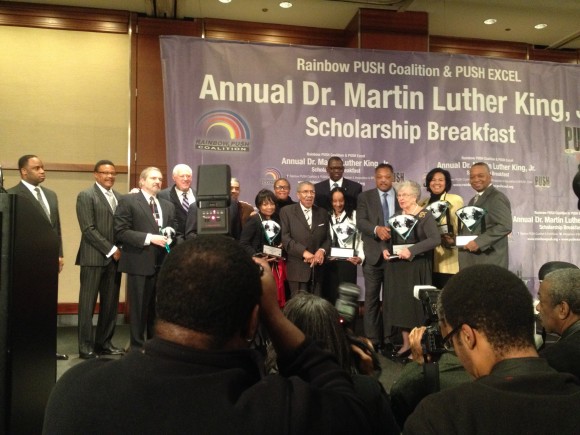 (more…)
(more…) -
Photo: The Woodlawn Organization Headquarters

